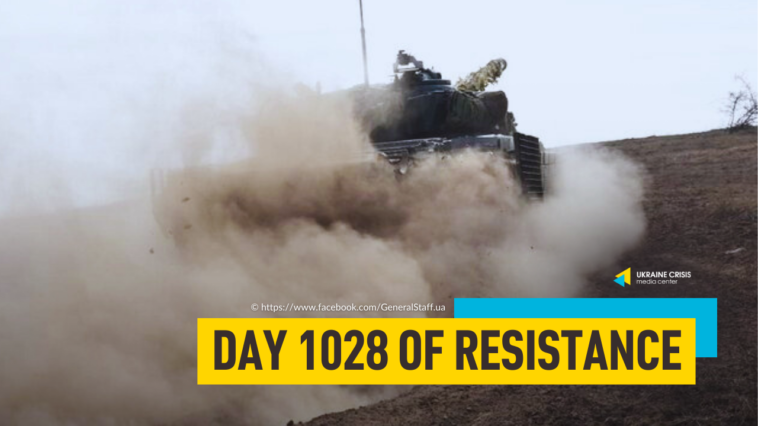Despite the pledges made at the NATO Washington summit to send more air defense systems, Ukraine still doesn’t have them, Zelenskyi says. Ukraine has lost half of the territories it once controlled in Russia’s Kursk region, according to The Economist. The head of Russia’s chemical forces killed in a blast in Moscow claimed by Ukraine.
Despite pledges made at NATO Washington summit to send more air defense systems, Ukraine still doesn’t have them, Zelenskyi says
NATO allies pledged more air defense systems to Ukraine at the Washington summit to balance out the fact that the country did not get an invitation to join the Alliance. Addressing the leaders’ gathering of Joint Expeditionary Force countries via video link on Tuesday, Ukrainian President Volodymyr Zelenskyi called on the allies to fulfil the promise.
Last Friday, Russia launched a major missile attack on Ukraine, targeting the country’s energy grid, Zelenskyi said.
“They waited for the cold weather to strike. There were 94 missiles and nearly 200 attack drones in this strike. Fortunately, we managed to defend ourselves. But we know — this is just a pause, and Russia will try to strike again as soon as they are ready, they always do this,” he added.
Ukraine needs 12 to 15 additional air defense systems to fully protect its skies from Russia’s “aerial terror,” Zelenskyi said.
“We need the full implementation of the agreements on air defense deliveries, particularly those made at the NATO Summit in Washington. We remember that to compensate for the inability to invite Ukraine to join the Alliance at that stage, a significant number of air defense systems were promised to us. I ask for your help to deliver on this,” he told the gathering.
“It’s doable. The main thing is our partners’ political will,” he added.
Ukraine has lost half of territories it once controlled in Russia’s Kursk region, according to The Economist
Four and a half months into the Kursk incursion, Ukraine has lost “about half” of the territories it once controlled in Russia’s region. Every Ukrainian unit in Kursk is now on the defensive. Worsening weather conditions and constant Russian aerial attacks further complicate the situation, a recent piece from The Economist reveals. The paragraphs below are quoted from the article.
At a command post to the north, Major Ivan Bakrev is candid about Ukraine’s troubles in the salient. The artillery commander in the 82nd Air Assault Brigade says Vladimir Putin’s men are tightening the screws, and that was so even before North Korean soldiers began to join the battle.
The Russians enjoy a “massive” advantage in almost everything—men, artillery, machines—and switch between mechanised and infantry assaults to powerful effect.
Ukraine has already lost “about half” of the territories it once controlled. The reverses began when Ukraine swapped out elite units for less hardened ones in late September; that was a mistake, the major reckons. Now the Russians are trying to choke off their main grouping from Ukraine proper by attacking on their east and west flanks. “Every unit in Kursk has switched to defence,” he says.
The urgency of Russia’s counter-attack appears tied to Donald Trump’s impending inauguration. Mr Putin wants Kursk to be a done deal by January 20th, rather than an embarrassing topic for discussion. Volodymyr Zelensky seems equally determined to retain the pocket as a bargaining chip. The Ukrainians are holding on, though the conditions on (and under) ground are getting grimmer.
“Rain, slush, snow, cold, mud, beetles, worms, rats and glide bombs,” says Ruslan Mokritsky, a 33-year-old non-commissioned officer in the 95th Air Assault Brigade. The Russians can drop as many as 40 glide bombs on one position in the space of a few hours, he says. “In Kursk, death is always close; it practically holds your hand.”
Ukraine has so far found ways to respond to new challenges—even Russian chemical attacks, he says. “If the Death Star showed up above us, we’d figure a way out.”
Four and a half months in may be too early to judge the Kursk operation. Born at a moment of desperation for Ukraine, whose commander-in-chief, Oleksandr Syrsky, was facing the sack, the incursion did not achieve its goal of diverting troops from Russia’s main effort in Donetsk province. It has cost Ukraine some of its elite troops. But it did ease the pressure elsewhere, and offered Ukraine a rare political fillip in a bad year. The soldiers seem to believe the counter-invasion was worth it, if only for giving the Russians a dose of their own medicine.
Head of Russia’s chemical forces killed in blast in Moscow claimed by Ukraine
An explosion in Moscow early Tuesday killed Lieutenant General Igor Kirillov, the head of Russian military’s radiological, biological and chemical protection forces, and his aide.
A scooter with explosives was detonated when the two men were exiting an apartment building in the Russian capital.
Russia’s Investigative Committee has launched a probe into the attack, calling it a “terrorist act.”
On Monday, Ukraine’s Security Service charged Kirillov in absentia for war crimes, saying that more than 4,800 cases of Russian use of chemical munitions had been recorded on Kirillov’s orders since the invasion.
More than 2,000 soldiers with symptoms of chemical poisoning have been sent to medical facilities across Ukraine since Russian began its full-scale invasion of the country, the Ukrainian military said.
Ukrainian security sources told Ukrainska Pravda that Kirillov was killed in an operation led by the Security Service of Ukraine.
“Kirillov was a war criminal and an absolutely legitimate target, since he gave orders to use prohibited chemical weapons against the Ukrainian military,” an informed source in Ukraine’s Security Service asserted to the news site.




